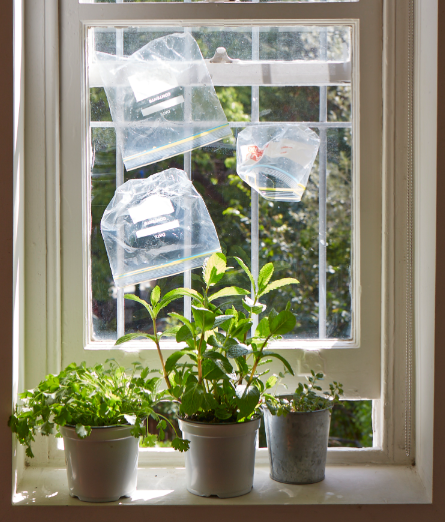I’m obsessively practical with eating and cooking. A huge part of my eating plans (on both the online 8-Week Program and in my books) includes pre-cooking and freezing meals, or ingredients to turn into meals, in ziplock or sandwich baggies. My trick – which can stop barbeques – is this bit. Ready? I wash them out after use. Yep, revolutionary.
To be fair, the bit that gets people falling off stools is the drying technique I invented, ‘cos that’s the bit we all find annoying right? This is how it goes:
With my hand slipped into the inside of the wet bag, I slap it on my kitchen window or splash-back.
It sticks, drys, and then…
Falls off when ready to store/use again. Ingenius!
OK, but the question is, does it make a damn bit of eco difference?
One 2007 Californian study showed that 220 litres of water were required to produce 1500 plastic bags—about 0.15 litres of water per bag. It takes five seconds to wash out a baggie. Since most kitchen taps flow at about 7.5 litres per minute, that’s roughly 0.6 litres of water per washing, or about four times the amount required to make a new plastic bag.
But leaving aside the water cost, the other benefits of reusing bags—savings on raw materials, emissions from shipping, and landfill space—make washing completely worthwhile, says Darby Hoover, a senior resource specialist at the Natural Resources Defense Council. Because you’re reusing, fewer bags need to be produced. And less energy, water and a non-renewable resource will be used for those bag productions.
Even if you have to use water to wash out a bag, you’re saving resources overall.
To my mind it totally stacks up. I’m going to to stun folk at my next dinner party with these “finessing” tips.
1. Avoid using really hot water. There’s been some concern that chemicals from plastic bags could leach into foods at high temperatures. While there aren’t any studies on hot water washing changing the chemical structure of the bags, just to be safe, avoid really hot water.
2. Only rinse and reuse if you’ve used the bag for salads or veggies. (Not for raw meats.)
3. Try to recycle your old bags once you’re done with them (when they change colour or opacity they’re no longer good for use).
4. Invest in good quality reusable bags.
Have you tried washing and reusing your ziplock bags? Any other waste-free tips you use in the kitchen?


